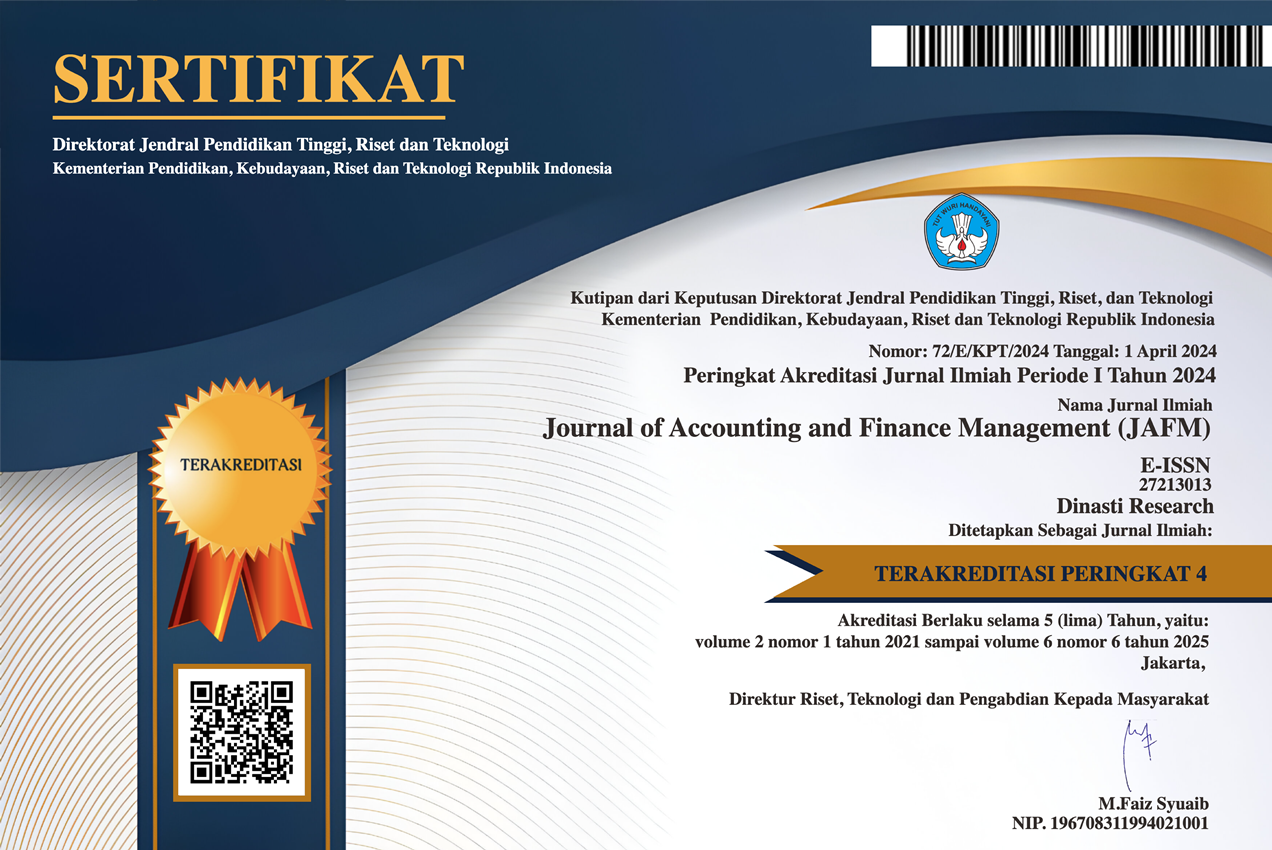Determination of Competency, Work Discipline and Motivation on employee performance at Universities in Indonesia
DOI:
https://doi.org/10.38035/jafm.v5i4.743Keywords:
Determination of Competence, Work Discipline, Motivation, Employee PerformanceAbstract
How to accept educational staff who lack competence with the level of job satisfaction of staff due to lack of competence and measure the level of motivation that has continued to decline since entering the staff, that the level of staff discipline has decreased. Quantitative research, which is a type of research emphasizing the testing of theoretical theories through measuring research variables with numbers and requiring data analysis with statistical procedures. The measuring instrument for this research is a questionnaire, the data obtained is in the form of answers from staff to the questions asked. based on the research objectives that have been set, this type of research is explanatory. The statistical t value of the effect of competence (KO) on motivation (MO) is 5.29 with a positive structural equation coefficient, that competence has a positive and significant effect on motivation. The more competence of university staff, it will increase employee motivation, otherwise the less competence the university staff has, it will reduce work motivation and can even transmit decreased motivation to other staff so that motivation becomes the main thing that must be owned by university staff. For universities, it is better when recruiting educational staff to have basic competencies so that they can increase the motivation of the staff themselves and form an academic culture that is in accordance with academic rules
References
AA. Anwar Prabu Mangkunegara. (2017). Manajemen Sumber Daya Manusia Perusahaan. Bandung : Rosda.
Afandi, P., & Supeno, B. (2016). The Influence of Competence, Organization Culture and Work Environment to Teacher’s Performance As Well As Its Implication on Grad Competence of State Senior Islam Schools on Padang City. International Journal of Business and Management, 11(5), 283. https://doi.org/10.5539/ijbm.v11n5p283
Aminuddin, D., & Mulyadi, M. (2020). Efektivitas Layanan Informasi Karir Dalam Meningkatkan Kemampuan Perencaanaan Karir Siswa. Consilium?: Berkala Kajian Konseling Dan Ilmu Keagamaan, 6(2), 52. https://doi.org/10.37064/consilium.v6i2.6365
Amiroso, J., & Mulyanto. (2015). Influence of Discipline, Working Environment, Culture of Organization and Competence on Workers’ Performance through Motivation, Job Satisfaction (Study in Regional Development Planning Board of Sukoharjo Regency). European Journal of Business and Management Www.Iiste.Org ISSN, 7(36), 86–95. www.iiste.org
Jeffrey, I., & Author, C. (2017). The Effect of Competence, Training and Work Discipline
towards Employees’ Performance (A Case Study at PT. Krakatau Argo Logistics). International Journal of Business and Management Invention ISSN, 6(7), 77-86
Noel, F. R., Lapian, J., & Pandowo, M. (2017). The Affect of Work Discipline and Competence on Employee Performance. Jurnal EMBA, 5(3), 3528–3537.
Prawirosentono, S., & Primasari, D. (2017). Kinerja & Motivasi Karyawan, Membangun
Organisasi Kompetitif Era Perdagangan Bebas Dunia. Yogyakarta: BPFE-Yogyakarta
Rivai, Veithzal dan Sagala, Ella Jauvani. (2016). Manajemen Sumber Daya Manusia untuk
Perusahaan dari Teori ke Praktik. Jakarta: PT Raja Grafindo.
Rivai, V. (2019). Manajemen Sumber Daya Manusia Untuk Perusahaan, Edisi 2. Jakarta:
Rajawali Pers
Sudarmanto, (2011). Kinerja dan Pengembangan Kompetensi SDM. Yogyakarta: Pustaka
Pelajar.
Suyitno, S. (2017). Effect of Competence, Satisfaction and Discipline on Performance of Employees in the Office of Women Empowerment and Family Planning of West Papua. Asian Social Science, 13(5), 144. https://doi.org/10.5539/ass.v13n5p144
Wibowo (2012). Manajemen Kinerja. Jakarta: raja Grafindo Persada.
Downloads
Published
How to Cite
Issue
Section
License
Copyright (c) 2024 Adi Muhajirin, Hapzi Ali, Tri Widyastuti, Sugeng Suroso

This work is licensed under a Creative Commons Attribution 4.0 International License.
Authors who publish their manuscripts in this journal agree to the following conditions:
- The copyright on each article belongs to the author(s).
- The author acknowledges that the Journal of Accounting and Finance Management (JAFM) has the right to be the first to publish with a Creative Commons Attribution 4.0 International license (Attribution 4.0 International (CC BY 4.0).
- Authors can submit articles separately, arrange for the non-exclusive distribution of manuscripts that have been published in this journal into other versions (e.g., sent to the author's institutional repository, publication into books, etc.), by acknowledging that the manuscript has been published for the first time in the Journal of Accounting and Finance Management (JAFM).

























